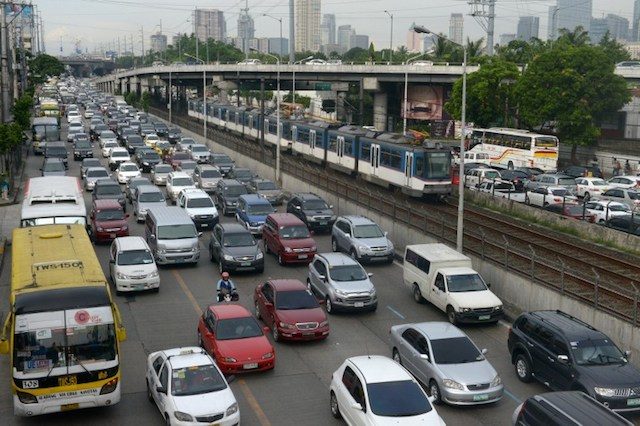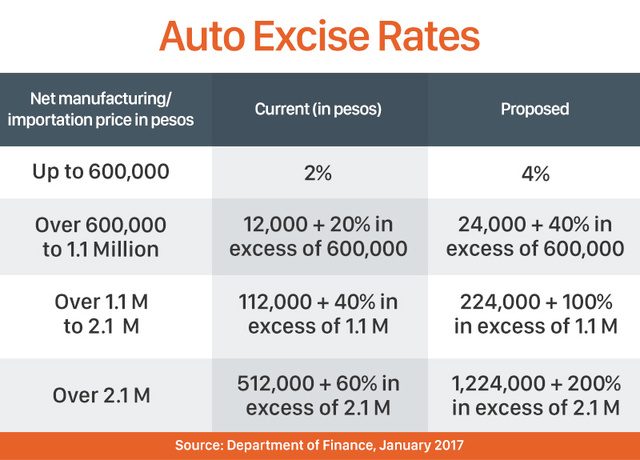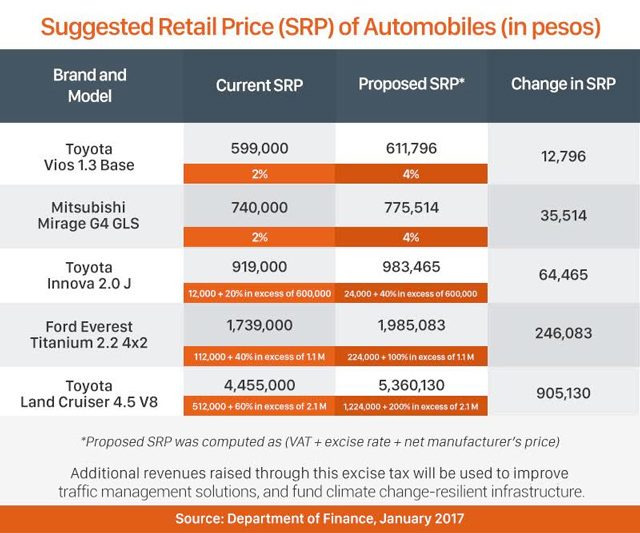SUMMARY
This is AI generated summarization, which may have errors. For context, always refer to the full article.

MANILA, Philippines – Car manufacturers and motorists’ groups oppose Malacañang’s version of the tax reform bill, saying that imposing higher excise taxes on automobiles would be unfair to the public. (READ: Duterte’s tax reform: More take-home pay, higher fuel and auto taxes)
Augusto Lagman, president of the Automobile Association of the Philippines (AAP), said it is not fair to burden the people when there is no efficient public transport system in the country.
“I don’t think we should make private vehicles too expensive because public transport is not that efficient at this time. If there is an efficient subway system, then we will not need as many cars,” Lagman said in a Senate hearing on Thursday, June 8.
“It’s not going to be fair to the commuting public that we don’t have that efficient transport system and yet we are shelling out big amounts in order to buy private vehicles,” he added.
Rommel Gutierrez, president of the Car Assemblers and Manufacturers of the Philippines Incorporated (CAMPI), said the rates pushed by the Department of Finance (DOF) are “too high and unreasonable.” They are more in favor of the House version.
The tax rates proposed by the DOF, he added, would “curtail” the industry.
“The industry is quite concerned about these proposals of DOF, with the rates they are proposing, that this would curtail the growth of the auto industry,” he added.
Gutierrez said the imposition of higher taxes on cars is inconsistent with the Department of Trade and Industry’s Comprehensive Automotive Resurgence Strategy (CARS) program.
CARS is meant to “attract new investments, stimulate demand, and effectively implement industry regulations that will revitalize the Philippine automotive industry, and develop the country as a regional automotive manufacturing hub.”
To further prove his point, Gutierrez said local Toyota executives had a difficult time convincing their principals in Japan to continue manufacturing in the Philippines because other countries offer a better business climate.
“Here comes DOF imposing these taxes. It’s just inconsistent and really, even about principals abroad, they’re having doubts where really the government is going. So we need consistent policy,” Gutierrez said.
Malacañang version
Malacañang’s version proposes a higher take-home pay for the public but seeks higher excise taxes on automobiles, fuel, and sugar-sweetened beverages. Under the Palace version, there is a 4-bracket excise tax structure for automobiles.
Gutierrez said they prefer the House version, which proposes a 5-bracket excise tax structure with a two-year phase-in period for the tax increases.
This is Malacañang’s version:

Take the case of the Toyota Vios 1.3 Base. If Malacañang’s version is signed into law, the price of the vehicle will increase by nearly P13,000 – from P599,000 to P611,796.
For the luxury models, the planned increase in prices is almost P1 million.

But Trade Secretary Ramon Lopez earlier said his agency backs the DOF plan to increase taxes on luxury cars. That proposal includes a steep increase for cars priced at P2.1 million and above.
Lopez pointed out that buyers at that level are not as price-conscious.
“Buyers in this market no longer ask what the price of a vehicle is because they can afford to buy it… The industry will not die,” he said. – Rappler.com
Add a comment
How does this make you feel?





There are no comments yet. Add your comment to start the conversation.